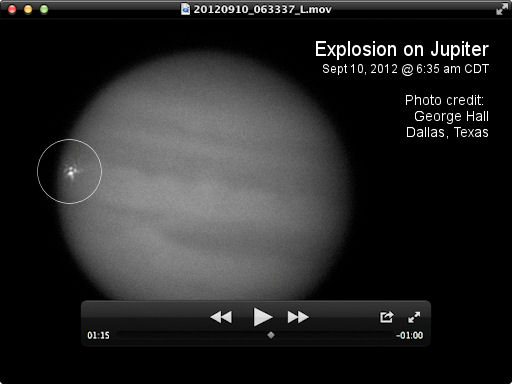Truth Vibrations
New member
Another impact on Jupiter:
From spaceweather.com:
Here's this as well:
http://cosmiclog.nbcnews.com/_news/2012/09/10/13789057-flash-spotted-on-jupiter-is-it-a-hit
From spaceweather.com:
EXPLOSION ON JUPITER: Apparently, something hit Jupiter during the early hours of Sept. 10th (11:35 UT), igniting a ferocious fireball in the giant planet's cloudtops. Amateur astronomer Dan Peterson Racine, Wisconsin, saw it first through his Meade 12" LX200 telescope. "It was a bright white flash that lasted only 1.5 - 2 seconds," he reports. Another amateur astronomer, George Hall of Dallas, Texas, was video-recording Jupiter at the time, and he confirmed the fireball with this video screenshot:

The fireball was probably caused by a small asteroid or comet hitting Jupiter. Similar impacts were observed in June and August 2010. An analysis of those earlier events suggests that Jupiter is frequently struck by 10 meter-class asteroids--one of the hazards of orbiting near the asteroid belt and having such a strong gravitational pull.
Astronomers around the world will now begin monitoring the impact site for signs of debris--either the cindery remains of the impactor or material dredged up from beneath Jupiter's cloud tops. Some impacts do produce such debris, while others don't. Researchers aren't sure why; perhaps this event will provide some clues. Stay tuned for news about what happens next.
Update: George Hall has posted a complete video of the explosion on Flickr.
Here's this as well:
Flash spotted on Jupiter: Is it a hit?
By Alan Boyle
Astronomers are abuzz over sightings of a flash on Jupiter — which suggests that the giant planet has taken another bullet for the solar system team.
Today's report follows similar sightings of impacts in 2009 and 2010. As in those earlier cases, the call has gone out to look for any visible scars on Jupiter's cloud tops. That would be a sure sign that an asteroid or comet was drawn in by the planet's gravitational pull, potentially saving us from a cosmic collision threat.
"It's kind of a scary proposition to see how often Jupiter gets hit," said George Hall, an amateur astronomer from Dallas who captured the flash on video this morning.
Hall didn't actually see the hit when it happened. Early this morning, he brought out his 12-inch Meade Schmidt-Cassegrain telescope with the Point Grey Flea3 video camera attached, just to capture imagery for a composite picture of Jupiter. "Jupiter happens to be ideally positioned at about 6 o'clock in the morning," he explained. "It's right overhead."
That also just happened to be the time when another amateur astronomer from Oregon, Dan Petersen, made a visual observation of the flash. Peterson didn't capture an image of the flare, which lasted only a couple of seconds, but he did send his sighting report to other astronomers.
"I decided to just observe on this particular morning," he said in an email to Philippine amateur astronomer Christopher Go. "Had I been imaging I probably would have missed it while playing with webcam settings and focusing."
Go relayed Peterson's report to the Association of Lunar and Planetary Observers' Jupiter forum, which set the place buzzing. Hall noticed the online hubbub and went back to review the video file on his computer. "I never would have looked" if it weren't for Petersen's report, Hall told me. The time stamp on Hall's video matched up with Petersen's observations — 6:35 a.m. CT, which is 7:35 a.m. ET or 11:35 GMT.
Hall reported his find, and shared in the accolades from fellow amateurs.
Universe Today's Nancy Atkinson quotes amateur astronomers as saying that the impact area should come back into view starting at about 1 a.m. ET Tuesday.
Jupiter impacts are of great interest to astronomers, amateur and professional, because they're part of the orbital billiards game that has shaped our solar system. In some cases, the cosmic interloper is destroyed before it has any visible effect on Jupiter's cloud tops. In weightier cases, the object breaks up and leaves black marks on the planet's atmosphere. The case of Comet Shoemaker-Levy 9 in 1994 is the most notable in recent memory.
Beyond the planetary science, there's the "phew" factor: Astronomers suspect that giant Jupiter's gravitational pull serves as a cosmic shield, sweeping up incoming objects that would have a deadlier effect if they were to slam into our planet. Some scientists say that without Jupiter, life on Earth wouldn't have had much of a chance.
How big was the object that caused today's flash? Stay tuned: We may get a better fix on that once astronomers get a follow-up look. But Hall probably won't be among the legions keeping watch on Tuesday morning. He's lost enough sleep over the past couple of nights.
http://cosmiclog.nbcnews.com/_news/2012/09/10/13789057-flash-spotted-on-jupiter-is-it-a-hit
